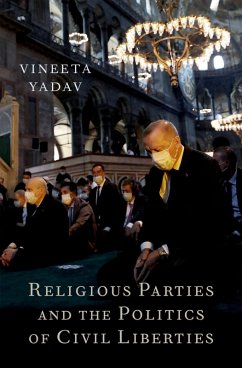A data-driven explanation of when successful religious parties reduce the civil liberties of their citizens in Muslim-majority countries and when they don't. Religious parties are increasingly common across the world. More and more, they participate in elections, win legislative seats, and join governments, particularly in Muslim-majority countries. Since they are often founded on orthodox principles that are inconsistent with liberal democracy, their rise potentially holds consequences for the prospects of liberal democratic values and practices-and this risk has inspired much heated debate. In Religious Parties and the Politics of Civil Liberties, the award-winning political science scholar Vineeta Yadav considers a question that has been central to the discussion: Will the success of religious parties lead to declines in the civil liberties of their citizens? Yadav summarizes the popular and academic sides of the conversation and addresses the weaknesses of both by presenting an original empirical analysis of religious parties' actual relationship to civil liberties. Many believe that if religious parties come to power, they will curb civil liberties in order to realize their religious visions. Academic research on religious parties, however, claims that the need to compete in elections incentivizes religious parties to moderate their behaviors and policies, including on civil liberties. Neither of these assertions has been systematically tested until now. With this book, Yadav adjudicates the debate using systematic data that covers all Muslim-majority countries for a period of almost forty years. She highlights the role that religious lobbies play in this issue and goes on to identify the specific conditions under which religious parties do or don't curb civil liberties. A sweeping comparative account that combines large-N analysis with focused studies of Turkey and Pakistan, this book will reshape our understanding of the relationship between religious party strength and the preservation of civil liberties.
Dieser Download kann aus rechtlichen Gründen nur mit Rechnungsadresse in A, B, BG, CY, CZ, D, DK, EW, E, FIN, F, GR, HR, H, IRL, I, LT, L, LR, M, NL, PL, P, R, S, SLO, SK ausgeliefert werden.


